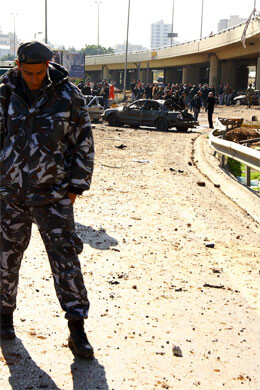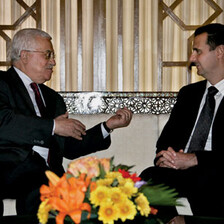Electronic Lebanon 30 January 2008

The previous weekend’s riots came days after a massive blast in Beirut on 25 January that killed a senior intelligence officer and several others, further raising anxiety levels in the Mediterranean capital. (Hugh Macleod/IRIN)
The disturbances come after all international and regional initiatives to resolve the impasse have hit a dead end. What the politicians seem incapable of resolving is blowing up in chaotic bouts on the street. A politically charged environment and an apparently genuine lack of concern on behalf of all political parties to the plight of ordinary people is proving to be an explosive formula. In this instance, questions were raised about the role of the army. The military establishment is the only institution in the country to be perceived as neutral as of late. The entering of its top commander General Michel Suleiman into the fray of presidential elections and the events at Mar Mikhael, where the casualties were members or supporters of the Shiite opposition groups Hizballah and Amal, have led many to believe that a rift between the resistance and the army is in the making, and if that happens, civil war is only a few more riots away.
Sateh Noureddine of As-Safir explores the implications of this weekend’s riots and their violent suppression on the relationship between the army and the opposition groups. Nayla Tueni of An-Nahar laments the inescapable politicization of the social and economic demands of ordinary people. Meanwhile, based on his reading of past similar incidents, Jean Aziz of Al-Akhbar tries to delve into the minds of the March 14 movement and behind allowing the situation to deteriorate into the bloodletting confrontation.
As-Safir, 28 January 2008, Sateh Noureddine, “Organized chaos”:
Army chief Michel Suleiman has become an unacceptable presidential candidate among the opposition. And among the opposition’s supporters, the army itself has ceased to be a trusted institution to preserve security and stability. This is the first outcome of the battle of Mar Mikhael. And this is the most prominent sign that a civil war has become a reality on the ground.Lebanese history shows that when a main sect at least loses its trust in the military, its resorting to self-protection becomes legitimized and justifiable and hence its clashing with other sects inevitable …
Until now, there are still constraints that prevent the outbreak of a civil war. For the army has not completely fallen, and will not break down soon, and his leader remains, at least in principle, a consensus candidate for the presidency. The dilemma however is that the insistence by the opposition to oust him from the presidential race can only cause grave damage to the role of the military establishment who achieved under his leadership over the past three years more than victory on the security and political fronts …
The battle of Mar Mikhael is the first step in a long and winding path that will not end without assuring Syria of its internal security that is threatened by the international tribunal into the killing of former prime minister Rafiq Hariri.
And from today onward, any demonstration, even if it were indeed based on social and economic woes, will lead at a later stage to a schism within the army …
Organized vacuum has ended and organized chaos has begun.
An-Nahar, 24 January 2008, Nayla Tueni, “Don’t stomp on the true demands of people”:
Once again, politics threaten the vital demands and true suffering of the working class and of those teetering under the weight of welfare crises. This, despite that everyone is aware that none of the political leaders of any of the camps are themselves affected or concerned by this crisis.Amid the most dangerous political conflict the country is witnessing, there is no genuine space for the deep worries of ordinary people in Lebanon today. And the credibility of the motivations behind everything that we are seeing today and might see in the future, from strikes to protests, is suspect. This is because the political struggle sweeps up along its way the suffering and the genuine demands and mingles it with political motives.
And what applies to the strike and those behind it, also applies to the parties opposing it. For both camps do not show any true responsiveness to the cries of the people, and officials on both sides are unable to reach a political compromise without which these leaders can demonstrate their genuine concern for the people’s plight.
Hunger does not know majority and minority, and disease does not distinguish between government and opposition and poverty cannot be categorized as March 14 or March 8.
The only remaining truth in Lebanon today is the growing numbers of the poor and the sick and the migrants.
Al-Akhbar, 29 January 2008, Jean Aziz, “The Incidents of Mar Mikhael”:
The minds behind the idea [of targeting Hizballah] were clearly saying that this project is not without precedent. It is a repetition for two previous attempts. The first was on 13 September 1993, the date of the signing of the Oslo Accord. “Citizens” who opposed the settlement took to the streets by the [Beirut] Airport bridge to protest. They were confronted by the army. Shots were fired and people were killed. Back then, the pundits of today’s government say, Hafez al-Assad wanted to send a message to the Americans. The message was: I am willing to go along with your plan, and I have the ability to, but let us discuss the price to be paid and the deal. The Americans back then turned down the offer.The second time was in 27 May 2004 in the Salloum neighborhood. “Citizens” took to the streets protesting the dire social and economics conditions they were living in. The army also confronted them, shots were fired and again people were killed. And the pundits of today’s government say this was the same message as before but this time by [current Syrian president] Bashar al-Assad. The Americans rejected the offer.
This time around, these pundits argue, the message must be originating from Lebanon, and directed by the government coalition and Bkerke [Catholic Patriarchate] and the [potential] president. The content of the message is identical, though: this is a sample of what we can do. We are capable of delivery and elimination. Let us talk about the kind of deal we can strike.
Is the army implicated in such a plot? All those concerned dismiss such an implication. Others believe that this was a win-win maneuver by the March 14 camp If the US appreciates the gesture and strikes a deal, [army chief and prospective president Michel] Suleiman will be indebted to the March 14 movement for it. And if it fails, March 14 will not lose anything, for then the army chief will lose his two winning cards, namely his success in maintaining security and his position as a candidate of consensus. Buy losing his winning cards, his nomination is annulled and this allows the government coalition to choose an alternative candidate to Sulieman who had contacted Bashar al-Assad a few days ago, whenever international and regional conditions are in their favor.
*Editor’s note: This number was later confirmed to be seven persons killed.
Meet the Lebanese Press is EI’s twice-monthly review of what is making the rounds in the Lebanese press and the pundits’ take on it.
Hicham Safieddine is a Lebanese Canadian journalist.





